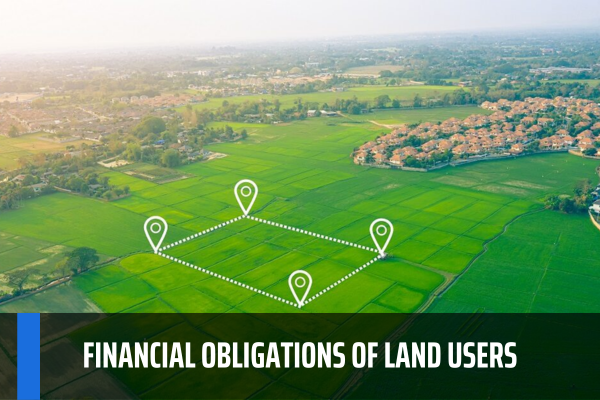When will the land be expropriated if land users fail to fulfill financial obligations in Vietnam? What are the cases of land expropriation due to violations of the Land Law 2013?
Is fulfilling financial obligations an general obligation of land users in Vietnam?
Pursuant to the provisions of Clause 3, Article 170 of the Land Law 2013 as follows:
General obligations of land users
...
3. To fulfill financial obligations in accordance with law.
Thus, according to the above regulations, fulfilling financial obligations in accordance with law (paying land use fees) is one of the general obligations of land users.

When will the land be expropriated if land users fail to fulfill financial obligations in Vietnam? What are the cases of land expropriation due to violations of the Land Law 2013?
When will the land be expropriated if land users fail to fulfill financial obligations in Vietnam?
Pursuant to the provisions of Clause 7, Article 12 of the Land Law 2013, failing to perform or fully perform financial obligations toward the State is one of the strictly prohibited acts.
Accordingly, based on Point g, Clause 1, Article 64 of the Land Law 2013, land users who fail to fulfill obligations to the State and have been administratively sanctioned for such violation but do not comply.
Specifically, Clause 13, Article 2 of Decree 01/2017/ND-CP has instructions on this content as follows:
Land expropriation against non-fulfillment of land user’s obligations
Land expropriation against a land user's non-fulfillment of obligations to the government pursuant to Point g, Section 1, Article 64 of the Land Law shall proceed if the land user does not or has not fulfilled the payment of the land use fee or land rent as per the laws and then oppose competent government authorities' coercion of financial obligations
Thus, (except in cases where the land user is not subject to financial obligations or is exempted or debited from financial obligations) if the land user does not or has not fulfilled the payment of the land use fee or land rent as per the laws and then oppose competent government authorities' coercion of financial obligations, the land will be expropriated.
At the same time, in Clause 1, Article 66 of Decree 43/2014/ND-CP amended by Clause 44, Article 2 of Decree 01/2017/ND-CP, there are instructions as follows:
Order and procedures for land recovery due to violation of law
1. For land recovery due to violation of law, when the statute of limitations for sanctioning administrative violations expires under the law on handling of administrative violations, competent sanctioning persons shall make records of administrative violations as a basis for land recovery.
When land-related violations of law are not subject to sanctioning of administrative violations under the law on sanctioning of administrative violations in the field of land, records of the violations must be made in the witness of representatives of commune-level People’s Committees as a basis for deciding on land recovery according to the following provisions:
a) The agencies in charge of natural resources and environment or competent government authorities shall conduct inspections to identify the violations defined in Point c, d, g, h and i, Section 1, Article 64 of the Land Law;
b/ Within 7 working days after making a record, the person assigned to conduct examination or inspection shall send this record to the competent land recovery agency for direction for land recovery.
Combined with the regulations on the statute of limitations for sanctioning administrative violations specified in Article 6 of the Law on Handling of Administrative Violations 2012 amended by Point a, Clause 4, Article 1 of the Law on amendments and supplements to certain Articles of the Law on Handling of Administrative Violations 2020, the The time for making records of administrative violations as a basis for land recovery decisions is determined as follows:
- Case 1:
The person with sanctioning authority is responsible for making a record after the 2-year statute of limitations for sanctioning administrative violations expires (calculated from the time the person with authority to perform official duties discovers the act of not paying land use fees). .
- Case 2:
If the failure to pay land use fees falls into the cases of not sanctioning administrative violations in Article 11 of the Law on Handling of Administrative Violations 2012, then the record of administrative violations as a basis for land recovery decisions is made as follows:
+ The Natural Resources and Environment Agency or a competent state agency organizes inspections to determine violations;
+ Within no more than 07 working days from the date of making the record, the person assigned to check and inspect is responsible for sending the record to the agency competent to recover land to direct land recovery.
+ The party determining the violation must have a representative of the commune-level People's Committee testify.
What are the cases of land expropriation due to violations of land law in Vietnam?
Pursuant to the provisions of Clause 1, Article 64 of the Land Law 2013 as follows:
Land expropriation due to violations of land law
1. Cases of land expropriation due to violations of the land law include:
a/ Land is not used for the purposes for which land has been allocated, leased, or land use rights have been recognized by the State and the land users, after having been sanctioned administratively for using land for improper purposes, still continue committing the violation;
b/ Land users intentionally damage land;
c/ Land was allocated or leased to wrong subjects or ultra vires;
d/ Land that is ineligible for transfer or donation as prescribed in this Law is transfeưed or donated;
e/ Land that is allocated by the State for management is encroached or occupied;
f/ Land that is ineligible for transfer of land use rights as prescribed by this Law is encroached or occupied due to the irresponsibility of land users;
g/ Land users who fail to fulfill obligations to the State and have been administratively sanctioned for such violation but do not comply;
h/ Land for annual crops that is not used for 12 consecutive months; land for perennial plants that is not used for 18 consecutive months; land for afforestation that is not used for 24 consecutive months;
i/ Land that is allocated or leased for implementing investment projects is not used within 12 consecutive months, or the land use schedule is 24 months late compared with the schedule stated in the project documents since the hand-over in the field. In case of not putting the land into use, the land use term may be extended 24 months and the investors shall pay a sum of money equivalent to the total land use levy or land rental for the delayed period. If the investors still fail to put the land into use when the extended time is over, the State shall recover the land without compensation for land and land-attached assets, except due to force majeure.
Thus, according to regulations, cases of land expropriation due to violations of the land law are determined according to the above content.
In particular, cases of land expropriation due to violations of the land law must be based on documents and decisions of competent state agencies determining violations of land law.
LawNet
